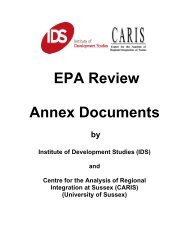The Impact of Energy Use on Poor Urban Livelihoods in ... - DfID
The Impact of Energy Use on Poor Urban Livelihoods in ... - DfID
The Impact of Energy Use on Poor Urban Livelihoods in ... - DfID
Create successful ePaper yourself
Turn your PDF publications into a flip-book with our unique Google optimized e-Paper software.
A Study <str<strong>on</strong>g>of</str<strong>on</strong>g> the <str<strong>on</strong>g>Impact</str<strong>on</strong>g> <str<strong>on</strong>g>of</str<strong>on</strong>g> <str<strong>on</strong>g>Energy</str<strong>on</strong>g> <strong>on</strong> <strong>Poor</strong> <strong>Urban</strong> <strong>Livelihoods</strong> <strong>in</strong> Arusha, Tanzania<br />
sav<strong>in</strong>gs. (Omari and Koda: 1991) Although some women <strong>in</strong> towns use formal sav<strong>in</strong>gs<br />
and credit societies and postal sav<strong>in</strong>gs accounts the major sav<strong>in</strong>g mode for most<br />
women is ‘upatu’ (kibati). Women have less access to credit than men and less<br />
m<strong>on</strong>ey to save but could benefit from expanded micro-f<strong>in</strong>ance and tra<strong>in</strong><strong>in</strong>g <strong>in</strong> its use’<br />
(THDR, 1999)<br />
C.7.6 Power relati<strong>on</strong>s<br />
Women's <strong>in</strong>creas<strong>in</strong>g ec<strong>on</strong>omic resp<strong>on</strong>sibilities and power has failed to relieve them<br />
<str<strong>on</strong>g>of</str<strong>on</strong>g> their productive roles. With the result that they have an <strong>in</strong>creased workload. As<br />
expla<strong>in</strong>ed by Bok men's tendency to ignore household resp<strong>on</strong>sibilities has not been<br />
sufficiently challenged.<br />
Instead the <strong>in</strong>creas<strong>in</strong>g <strong>in</strong>volvement <str<strong>on</strong>g>of</str<strong>on</strong>g> women <strong>in</strong> both waged employment and the<br />
<strong>in</strong>formal sector has affected power relati<strong>on</strong>s with<strong>in</strong> and between households. <str<strong>on</strong>g>The</str<strong>on</strong>g><br />
changed roles clash with the established patriarchal system which def<strong>in</strong>es women<br />
as dependent rather than <strong>in</strong>dependent social be<strong>in</strong>gs.<br />
While some men recognise the benefits they have ga<strong>in</strong>ed from their women's<br />
improved ec<strong>on</strong>omic strength, others do not. <str<strong>on</strong>g>The</str<strong>on</strong>g> latter group experience women's<br />
relatively new found ec<strong>on</strong>omic power as a challenge to their self-esteem. <str<strong>on</strong>g>The</str<strong>on</strong>g>ir<br />
reacti<strong>on</strong>s range from passivity to withdrawal <str<strong>on</strong>g>of</str<strong>on</strong>g> the cash support they used to give to<br />
their women. More serious is the sexual harassment (domestic violence) directed to<br />
some women (wives) who possess more ec<strong>on</strong>omic power than their husbands.<br />
<str<strong>on</strong>g>The</str<strong>on</strong>g> divisi<strong>on</strong> <str<strong>on</strong>g>of</str<strong>on</strong>g> labour, development <str<strong>on</strong>g>of</str<strong>on</strong>g> the labour force (male and female) and<br />
changes <strong>in</strong> the decisi<strong>on</strong> mak<strong>in</strong>g process at the household level are key to the<br />
alleviati<strong>on</strong> <str<strong>on</strong>g>of</str<strong>on</strong>g> poverty. For this reas<strong>on</strong> the authors support Biermann's (1997) plea for<br />
more research <strong>in</strong>to understand<strong>in</strong>g household allocati<strong>on</strong> <str<strong>on</strong>g>of</str<strong>on</strong>g> resources, <strong>in</strong> order to<br />
enable policy makers to devise social policies which will affect changes at household<br />
level for the better (Biermann:97).<br />
This study c<strong>on</strong>tributes to this understand<strong>in</strong>g by clarify<strong>in</strong>g the relati<strong>on</strong>ships around the<br />
energy decisi<strong>on</strong> mak<strong>in</strong>g process <strong>in</strong> urban households, and by rais<strong>in</strong>g awareness, <str<strong>on</strong>g>of</str<strong>on</strong>g><br />
poor households and other stakeholders, <str<strong>on</strong>g>of</str<strong>on</strong>g> the importance <str<strong>on</strong>g>of</str<strong>on</strong>g> the energy process<br />
and the access to energy services for improv<strong>in</strong>g the susta<strong>in</strong>ability <str<strong>on</strong>g>of</str<strong>on</strong>g> livelihoods.<br />
Development Plann<strong>in</strong>g Unit, UCL L<strong>on</strong>d<strong>on</strong><br />
Dr. Sheilah Meikle and Patrice North
















